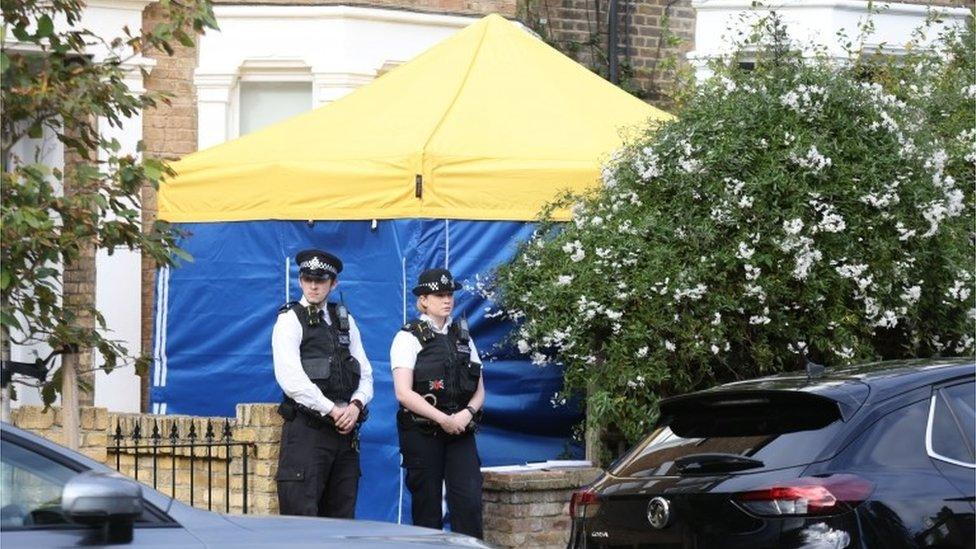Sir David Amess: Police continue to quiz man over MP's killing
- Published
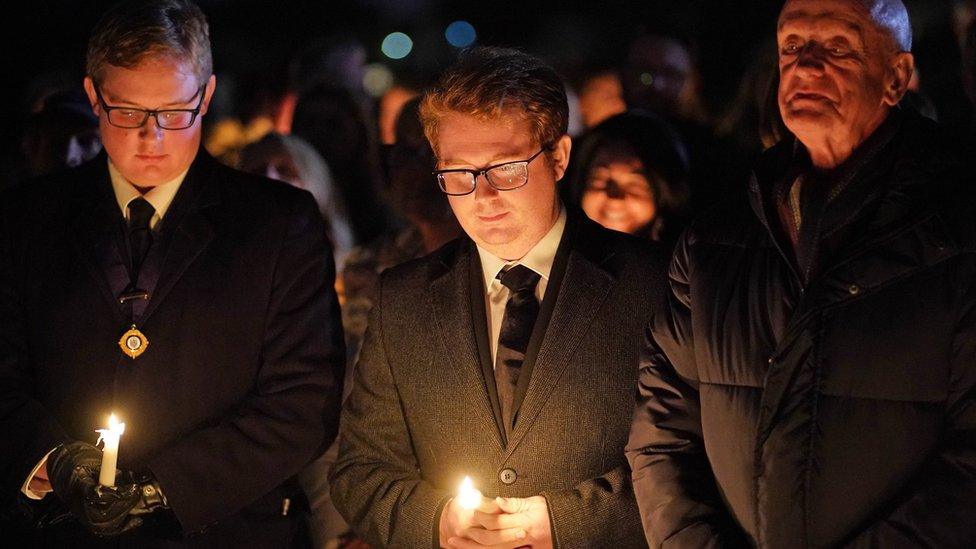
The vigil on Saturday night was held near where Sir David Amess was killed
Detectives are continuing to question a 25-year-old British man who was detained at the scene of Friday's fatal stabbing of MP Sir David Amess.
Officers spent Saturday searching three addresses in the London area and are not seeking anyone else.
Police are treating the attack in Essex as a terrorist incident, which may be linked to Islamist extremism.
The BBC understands the man was referred to the counter-terrorist Prevent scheme a few years ago.
Prevent is the UK's terrorism-prevention programme, which aims to stop people being radicalised.
Teachers, members of the public, the NHS and others can refer individuals to a local panel of police, social workers and other experts who decide whether and how to intervene in their lives.
Engagement in the scheme is voluntary and it is not a criminal sanction. It is unclear whether any further action was taken in the case of the suspect.
The suspect, who has not been named, was arrested on suspicion of murder on Friday. He was further detained under the Terrorism Act, and is now being held in a London police station.
On Saturday, the Metropolitan Police said detectives "were granted a warrant of further detention at Westminster Magistrates' Court, allowing them to keep the man in custody until Friday 22 October, when the warrant expires".
Government sources told the BBC that from initial inquiries, the UK national appeared to be of Somali heritage.
BBC security correspondent Frank Gardner said Whitehall officials were saying the arrested man was not on a database of terror suspects.
The UK's threat level has not changed since Friday and remains at "substantial", meaning a terror attack is likely.
Sir David, a Conservative MP since 1983, was holding one of his regular Friday meetings with his constituents at Belfairs Methodist Church in Leigh-on-Sea when he was stabbed multiple times.
The 69-year-old was married with four daughters and a son. A candlelit vigil is being held in Leigh-on Sea to mark Sir David's life.
Sir David is the second MP to be killed in recent years, following the murder of Labour MP Jo Cox in July 2016.
This latest attack has raised concerns for the safety of MPs, many of whom hold constituency surgeries which anyone can attend.

The home secretary described Sir David as a "man of the people"
Home Secretary Priti Patel said security measures were being put in place to protect MPs - but insisted they would carry on serving the country unimpeded.
"We will carry on, we live in an open society, a democracy," she said during a visit to the scene of the attack with Prime Minister Boris Johnson, Labour leader Sir Keir Starmer and Commons speaker Sir Lindsay Hoyle.
"We cannot be cowed by any individual or any motivation... to stop us from functioning, to serve our elected democracy."
Ms Patel maintained a balance could be found to allow face-to-face meetings with constituents to continue.
However, Conservative MP Tobias Elwood - who came to the aid of a stabbed police officer during the 2017 terror attack in Westminster - suggested MPs speak to constituents on the phone or over Zoom for the time being.
Labour MP Diane Abbott said she would prefer to meet constituents behind a screen to prevent possible stab attacks.
And Kim Leadbeater, the sister of Mrs Cox, said her partner had asked her to stand down as MP for Batley and Spen after Sir David's death.


Scotland Yard's decision that the killing of Sir David Amess was an act of terrorism confirms that, on the basis of what they know so far, the killer was motivated to use violence to further their cause.
There's no public suggestion from investigations at the moment that there is a specific additional threat to MPs. But detectives and colleagues in MI5 will be delving deeply into the life of the suspect to understand how he reached this mindset - and whether this was an attack by a "lone actor" or someone who is part of a network.
Secondly, it confirms the initial conclusion that there would need to be more resources thrown at the investigation.
Behind the scenes, a wider range of detectives and support staff will now have been brought into action. If officers have recovered the suspect's mobile phone, they will now be forensically examining its contents to uncover potential evidence of mindset and planning.
A phone - and any bank cards - will also help detectives track the suspect's movements in the days and weeks before the incident.
That in turn leads them to CCTV, so they can build a three-dimensional view of his life.

Tributes to Sir David have been pouring in from politicians as well as his local constituents.
The prime minister described him as "one of the kindest, nicest, most gentle people in politics", with an "outstanding record of passing laws to help the most vulnerable".
Ms Patel called Sir David a "man of the people" who was killed doing "a job he loved".
Labour leader Sir Keir Starmer said it was a "dark and shocking day", adding that the country had "been here before" with the death of Jo Cox.
Father Jeff Woolnough, a parish priest who led a mass on Friday evening in Sir David's memory, described him as a "great, great guy" and said faith communities had "lost their greatest supporter".
Members of Southend-On-Sea's Muslim community said, in a joint statement, his death was an "indefensible atrocity" and that Sir David would be remembered for his warmth, selflessness and kindness.

Attack casts shadow over Leigh-on-Sea
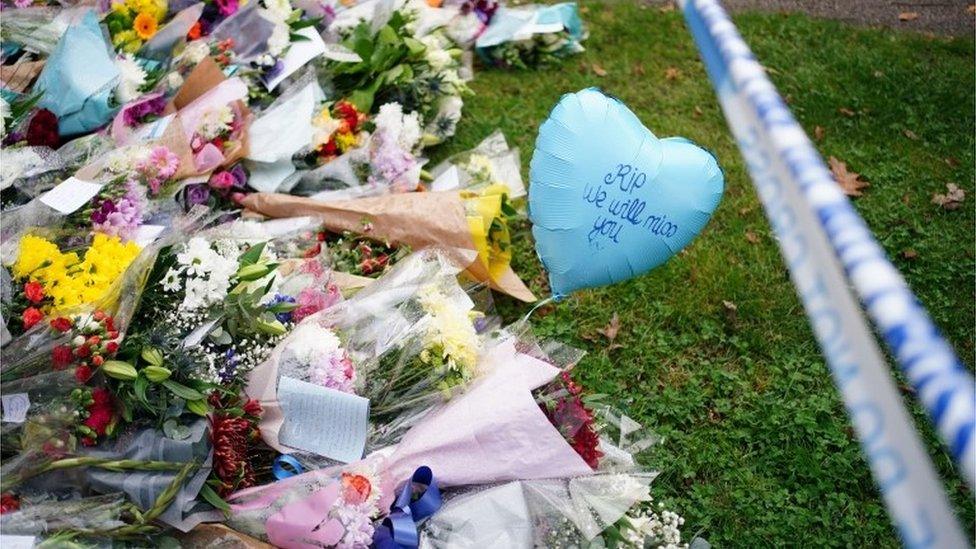
By Orla Moore & Richard Smith
The mood in Leigh-on-Sea, which Sir David represented for decades, is one of bewilderment.
As police and global media descend upon the usually quiet Essex town, people have gathered to pay tributes outside the Belfairs Methodist Church where the long-standing MP was attacked.
Resident Audrey Martin remembers him as "an absolute gentleman" who took time out to speak to her when she first moved to the area from Scotland.
"He just had this aura about him," she says.
And constituent Lorraine Migliorini highlights Sir David's work for children and young people with special educational needs.
"He was genuinely interested and listened to them which was fantastic," she says. "He got things done."
Julie Everitt, who has co-ordinated a vigil for him, says she would "always remember him for his genuine smile" and his passion for animal rights.
"He would go on campaigns, he was against the badger cull, he was against trophy hunting and fox hunting," she says.
"He was a good gentleman, he had a good heart."
Read more from Orla and Richard at the scene here.


Were you in the area? Did you witness the attack? If you feel able to do so please get in touch. Email haveyoursay@bbc.co.uk, external.
Please include a contact number if you are willing to speak to a BBC journalist. You can also get in touch in the following ways:
WhatsApp: +44 7756 165803
Tweet: @BBC_HaveYourSay, external
Please read our terms & conditions and privacy policy
If you are reading this page and can't see the form you will need to visit the mobile version of the BBC website to submit your question or comment or you can email us at HaveYourSay@bbc.co.uk, external. Please include your name, age and location with any submission.
Related topics
- Published15 October 2021

- Published16 October 2021
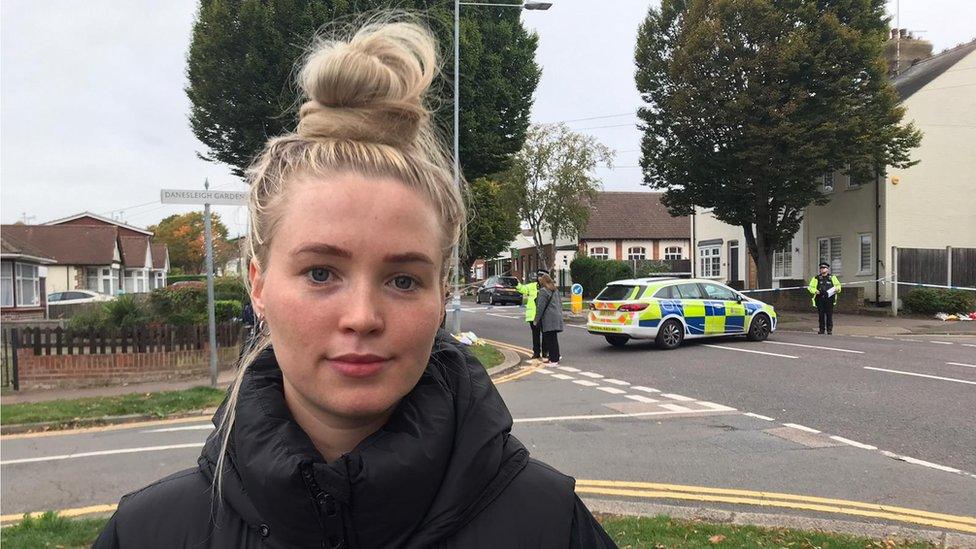
- Published16 October 2021
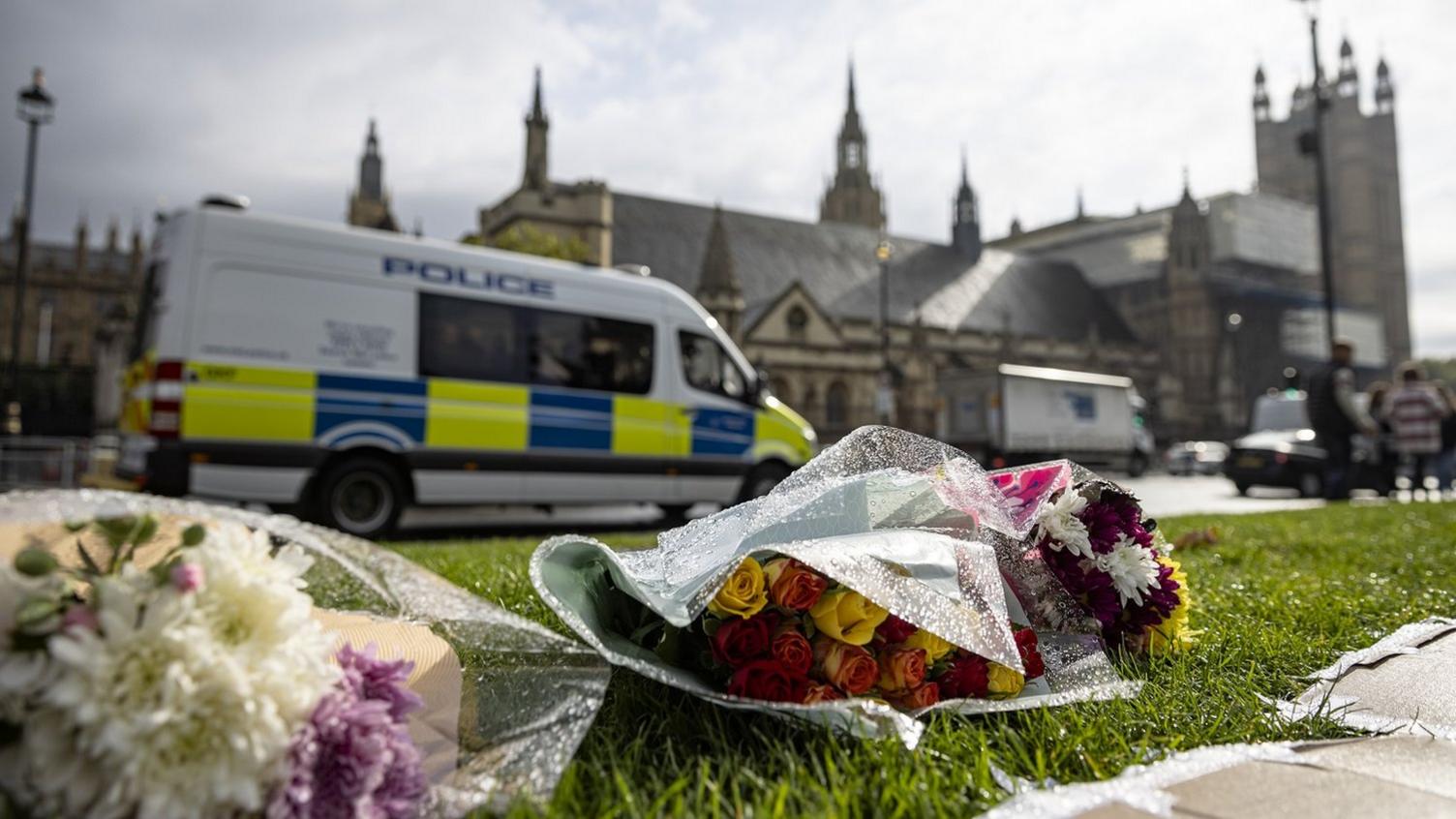
- Published18 October 2021
